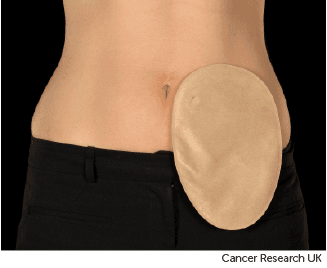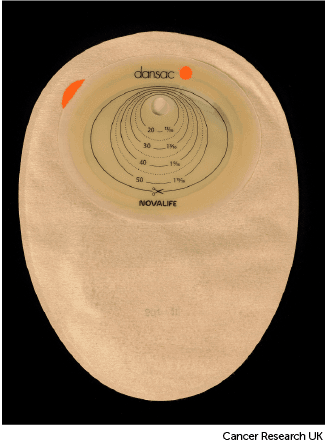Living with anal cancer
A colostomy is where your surgeon opens the end of your large bowel (colon) onto the surface of your tummy (abdomen). You normally have a permanent colostomy for anal cancer. This means you have it for the rest of your life.
To make a colostomy, your surgeon brings the end of your colon out onto the surface of your abdomen. They do this during an operation. It may be part of larger surgery to remove your anus, back passage (rectum) and part of your colon. Other people may have a colostomy before they have chemoradiotherapy.
You wear a special bag over the colostomy to catch the poo.

It can take time to get used to having a colostomy. You will need to think about your feelings about having it. And adjust to looking after it. But most people learn to do this. Your stoma nurse can give you advice and support you at all stages.
If you don't have a stoma nurse, ask your GP or surgeon to refer you. The nurses may be based at your local hospital. In some places they have community stoma nurses and you may see them at a local clinic.
When you first go home after surgery, your stoma nurse may see you at home. Or they may see you back at the hospital.
Read more about having a colostomy for anal cancer
It is normal to feel worried about how you will look if you need to have a colostomy. You may also worry about how other people react. You might worry that having a colostomy will affect your confidence. But being in charge of the practical elements of your stoma care can make you feel more in control and confident.
While you are in hospital the stoma nurse will teach you how to look after your colostomy. It might be helpful for a close friend or family member to be there too. Then you can both get used to your colostomy and can ask the nurse questions.
Having a colostomy shouldn’t stop you doing the things you want to. You may just have to make some temporary practical changes. Such as if you want to go on holiday. Then you may want to arrange an earlier delivery of supplies. Talk to your stoma nurse if you are worried how having a stoma will affect your plans.
Once you get home, help is still available if you need it. You might have problems or questions about looking after and dealing with your colostomy. Or you may feel low or depressed. Your GP or stoma nurse will either be able to help you or put you in touch with someone who can.
As you learn to cope with your colostomy, it will affect your daily life less. You may also find that you feel more positive and less sad once you get back to the things you enjoy in life.
Bowel Cancer UK or Colostomy UK can also give support.
Visit the Bowel Cancer UK website
Visit the Colostomy UK website
Having a colostomy usually doesn't interfere with most jobs. It might affect your work if it involves heavy digging or other kinds of manual work. Ask your stoma nurse for advice if your job is very strenuous.
A colostomy doesn't have to stop you from doing sports or hobbies. All sorts of physical activities are possible. Even strenuous exercise and swimming.
All stoma bags are suitable for exercise and swimming. But some people may want something smaller when doing sport and hobbies, so they might use a stoma cap. This is a small round bag that just covers your stoma.
Talk to your stoma nurse about how to best manage your stoma whilst doing sports and hobbies.
It is normal to smell your stoma bag when emptying or changing it. But if it smells otherwise, it could be due to the bag not fitting properly. Speak to your stoma nurse if you notice your bag smells when you are wearing it. They can check how well the bag fits you and may suggest you try a different type.
Stomas are of different shapes and sizes. So not all types of stoma bag may fit you. If the bag doesn't fit properly, you are likely to have problems with smell and leakage. Your stoma nurse can get different types of bags for you to try. You might have to try a few bags before you find the one that suits you best.
All bags have charcoal filters built into them. Charcoal is good for absorbing smells, and the filter lets gas escape from the bag. This means the bag doesn't get too full of air and feels uncomfortable. If the bag fits properly, you should only be aware of the smell when changing or emptying the bag.
These photos show the front and back of one type of colostomy bag;


There are products that can help to mask the smell of a colostomy but they can be difficult to find. Your stoma nurse will be able to give you tips on how to mask the smell when you are changing your stoma bag.
If your bag smells while you are wearing it, anti odour products should be the last resort. They should mainly be for people who have difficulties finding the perfect fit colostomy bag. You can ask your stoma nurse or Colostomy UK to suggest products for you.
Read more about living with anal cancer
Some people may have discharge from the rectum after a having colostomy before chemoradiotherapy. The discharge is mucus from the lining of the bowel. Mucus normally keeps the bowel moist and helps the poo pass through the bowel. After a colostomy, the bottom part of the bowel no longer has poo passing through it, but it still produces mucus. Dead cells from the lower bowel or rectum may be mixed in with the mucus.
The mucus may leak out of the anus, or you may feel the urge to go to the toilet. The mucus is normally clear or white and looks like egg white or glue. Sometimes the mucus dries up into a ball inside the rectum and can cause pain.
How often and how much rectal discharge varies in different people. It may be a couple of times a day or once every few weeks or months.
You should let your stoma nurse or doctor know if the mucus:
looks green
smells
has blood in it
Sitting on the toilet daily and gently bearing down (without straining) may help you naturally pass the mucus out of your rectum. Some people may need a suppository to help loosen the mucus. If you are worried about leaking discharge unexpectedly, you may want to wear a small absorbent pad to protect your clothes.
If mucus does leak out, it can make your skin sore. So, you may want to use a barrier cream to help protect your skin. If you are having radiotherapy, you should check with the team looking after you before using any creams. After a shower, pat your skin dry with a towel rather than rub it.
Having rectal discharge may feel embarrassing. But the team looking after you will be very used to supporting people with this. Your stoma nurse can tell you what to expect and how to deal with any discharge. They can also teach you pelvic floor exercises to help strengthen the muscles that help to control the leakage from the rectum.
Last reviewed: 03 Jul 2025
Next review due: 03 Jul 2028
Anal cancer is when abnormal cells in the anus divide in an uncontrolled way. It can start in different parts of the anus and different types of cell.
If your surgeon removes your anus, they open the end of your bowel onto your skin (stoma). This is a type of stoma called a colostomy. You wear a special bag over the stoma to collect the poo.
An abdominoperineal excision (APR) is a large operation to remove the anus, rectum and part of the bowel. Some people may have a local excision for a small stage 1 anal margin cancer.
You will need time to recover from surgery or any other treatment. But most people can have a normal sex life after having anal cancer.
You might need to change what you eat after treatment for anal cancer. Your digestion may need time to settle down. And you may not be able to eat all the foods you could before.
Anal cancer is cancer that starts in the anus. The anus is also called the anal canal.

About Cancer generously supported by Dangoor Education since 2010. Learn more about Dangoor Education
Search our clinical trials database for all cancer trials and studies recruiting in the UK.
Connect with other people affected by cancer and share your experiences.
Questions about cancer? Call freephone 0808 800 40 40 from 9 to 5 - Monday to Friday. Alternatively, you can email us.